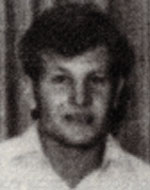Moshe Yitzhak (Yitzchakle), son of Malka and Eliahu was born on 7.11.1952 in Rehovot. He was a son of Holocaust survivor parents, immigrants from Romania, grew up in a religious home, studied Talmud Torah in Rehovot and Bnei Brak. He continued his studies at a yeshiva for young people in Ramot Remez in Haifa, and as a disciple of Rabbi Katz, proved to be a great talent, learning eagerly and persistently. Yitzhak was a good son to his parents, “the family’s glory,” a dear student to educators and a good friend to friends. He was evident in his help to others, shared with his friends their concern and distress, and was deeply involved with friends in heart and soul. A friend you can count on to help him at any time. Yitzhak was a smiling, solid and pleasant young man, full of joy of life, with a laugh and heaviness, a mischievous youthful and serious mischief, and an evening voice, with a beautiful prayer and the wisdom of blowing the shofar. heart and soul, Moshe-Yitzhak z “l was also an athlete. Moshe-Yitzhak was drafted into the IDF in mid-January 1971 and assigned to the Nahal Brigade, where he was revealed in all his glory as a brave, kind soldier who is willing to do a lot for the success of every exercise. In journeys he could always be in the head, but Isaac did not. He always went in the end, not because of exhaustion, but out of a desire to help the backward. After completing basic training, he was sent to the Nahal Brigade in Komalimut, volunteered for a paratroop training course and continued in the parachuting Nahal Brigade in the Komemiyut Brigade, where he spent his most recent months in service in the ” On Yom Kippur, on the 10th of Tishrei 5734 (October 6, 1973). The stronghold was attacked on the very same day, and Yitzhak participated in attempts to stop the Egyptians from being exposed to enemy fire. When the title of the stronghold was sent with three more fighters to an extreme position, whose fall would have allowed the enemy to enter the stronghold. From there, the four of them fought in short ranges, with light arms and grenades, against Egyptian commandos, who outnumbered them. During the battle, one of the fighters shouted that a grenade had been thrown at the outpost. The four decided not to abandon the position and risk being harmed. Moshe-Yitzhak, who was shooting at the enemy, collapsed at the grenade, and when he exploded, he received most of the shrapnel and was killed and his three friends remained alive. In his actions he “showed courage, a spirit of volunteerism and the brotherhood of fighters” – in the words of the honorable citation given to him by the chief of staff after his fall, leaving behind his parents, brother and sister. Upon the surrender of the “dock” stronghold, his body was handed over on a stretcher and all his personal documents to the Red Cross and to the governor of Suez, who promised to transfer his body to Israel’s grave. In the context of the peace treaty with Egypt, the return of his body was made possible and on the 20th of Elul 5739 (12.9.1979) he was laid to rest at the military cemetery in Kiryat Shaul.
